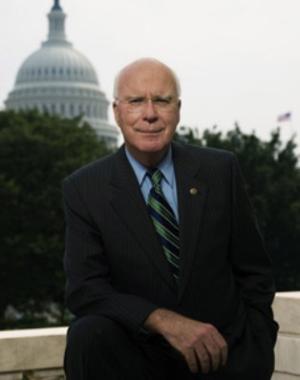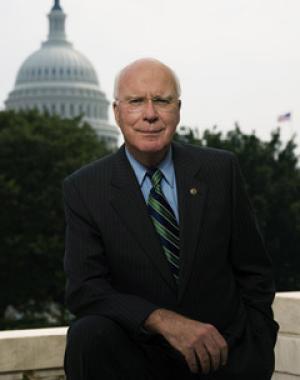In a major policy speech to the American Bar Association Monday, Attorney General Eric Holder announced sentencing reform measures he is ordering the Justice Department to undertake, especially backing away from the use of mandatory minimum sentencing for low-level nonviolent drug offenders.
It's not just Attorney General Holder's speech on sentencing reform Monday. The prospects for sentencing reform in the Congress are looking better than ever, with bills garnering bipartisan support.
The NYPD's stop-and-frisk program unconstitutionally targets racial minorities, a federal judge ruled Monday. Mayor Bloomberg isn't happy, but civil libertarians and black and brown New Yorkers are.
Citing the failure of the US and Mexican governments to respond to requests to elaborate a strategic vision for Mexican drug war assistance, Sen. Patrick Leahy has put a hold on $95 million in Plan Merida spending.
New Zealand forgot to kneejerk when confronted with new synthetic drugs. Instead of banning them, it has instead moved to regulate them. Other countries are paying attention to the innovative response.
One Arkansas medical marijuana initiative has been approved for signature-gathering, while a second still must win ballot title approval. But it looks like there will be two initiative campaigns there this year.
Medical marijuana wars continue in California, a Michigan town gets intrusive, Nevada prepares to rake in the dough from dispensaries, and Washington patients organize in the face of legalization.
An attempted drug bust turned fatal on Indianapolis's East Side Thursday night. A suspect fled, resisted, was tased, and then died.
There's trouble down South, and more out-of-control NYPD narcs cost the taxpayers.
Interns are making an important difference fighting the good fight with us at StoptheDrugWar.org.
US Attorney General Eric Holder announced Monday a comprehensive federal sentencing reform package with a strong emphasis on drug sentencing. He said he will direct US Attorneys that low-level, nonviolent drug offenders not tied to gangs or major trafficking organizations should not be charged in ways that trigger lengthy mandatory minimum sentences.

Attorney General Eric Holder (usjoj.gov)
Holder's announcement is only the latest indicator that -- after decades of "tough on crime" politics in Washington -- pressure is mounting to do something about the huge number of people in federal prisons. The Chronicle will be reporting on the rising calls for reform in both the executive branch and the Congress later this week.
In a major speech to the American Bar Association in San Francisco Monday morning, Holder laid out Obama administration sentencing reform plans, some of which can be implemented by executive action, but some of which will require action in the Congress. The comprehensive sentencing reform package is designed to reduce the federal prison population not only through sentencing reforms, but also through alternatives to incarceration in the first place.
"A vicious cycle of poverty, criminality and incarceration traps too many Americans and weakens too many communities," Holder said. "However, many aspects of our criminal justice system may actually exacerbate this problem rather than alleviate it. Too many Americans go to too many prisons for far too long and for no good law enforcement reason. We cannot simply prosecute or incarcerate our way to becoming a safer nation."
On drug sentencing, Holder said he would direct US attorneys across the country to develop specific guidelines about when to file federal charges in drug offenses. The heaviest charges should be reserved for serious, high-level, or violent offenders, the attorney general said.
There are currently more than 100,000 people incarcerated in federal prisons for drug offenses, or nearly half (47%) of all federal prisoners. The federal prison population has expanded an incredible eight-fold since President Ronald Reagan and a compliant Congress put the drug war in overdrive three decades ago, although recent federal prison population increases have been driven as much by immigration prosecutions as by drug offenses.
"It's time -- in fact, it's well past time -- to address persistent needs and unwarranted disparities by considering a fundamentally new approach," Holder told the assembled attorneys. "While I have the utmost faith in -- and dedication to -- America's legal system, we must face the reality that, as it stands, our system is in too many respects broken. The course we are on is far from sustainable. And it is our time -- and our duty -- to identify those areas we can improve in order to better advance the cause of justice for all Americans."
One of those areas, Holder said, is mandatory minimum sentencing.
"We will start by fundamentally rethinking the notion of mandatory minimum sentences for drug-related crimes. Some statutes that mandate inflexible sentences -- regardless of the individual conduct at issue in a particular case -- reduce the discretion available to prosecutors, judges, and juries," said the former federal prosecutor. "Because they oftentimes generate unfairly long sentences, they breed disrespect for the system. When applied indiscriminately, they do not serve public safety. They -- and some of the enforcement priorities we have set -- have had a destabilizing effect on particular communities, largely poor and of color. And, applied inappropriately, they are ultimately counterproductive."
In addition to reducing the resort to mandatory minimum sentencing and directing prosecutors to use their discretion in charging decisions, Holder will also order the Justice Department to expand the federal prison compassionate release program to include "elderly inmates who did not commit violent crimes and who have served significant portions of their sentences."
Beside the executive branch actions, Holder also committed the Obama administration to supporting sentencing reform legislation currently pending before Congress, specifically the Justice Safety Valve Act (Senate Bill 619), which would give federal judges the ability to sentence below mandatory minimums when circumstances warrant, and the the Smart Sentencing Act (Senate Bill 1410), which would reduce mandatory minimums for drug crimes, slightly expand the existing drug sentencing safety valve, and apply retroactively the Fair Sentencing Act of 2010's reduction in the crack-powder cocaine sentencing disparity.
"Such legislation will ultimately save our country billions of dollars," Holder said. "Although incarceration has a role to play in our justice system, widespread incarceration at the federal, state and local levels is both ineffective and unsustainable."
Sentencing and drug reform advocates welcomed Holder's speech and the Obama administration's embrace of the need for criminal justice reforms, but also scolded the administration and lawmakers for taking so long to address the issue and for timidity in the changes proposed.
"For the past 40 years, the Department of Justice, under both political parties, has promoted mandatory minimum sentencing like a one-way ratchet. Federal prison sentences got longer and longer and no one stopped to consider the costs and benefits," said Julie Stewart, founder and head of Families Against Mandatory Minimums (FAMM). "Today, at long last, the politics of criminal sentencing have caught up to the evidence. The changes proposed by the Attorney General are modest but they will make us safer and save taxpayers billions of dollars in the process."
"There's no good reason, of course, why the Obama administration couldn't have done something like this during his first term -- and tens, perhaps hundreds, of thousands of Americans have suffered unjustly as a result of their delay," said Drug Policy Alliance executive director Ethan Nadelmann in a message to supporters. "But that said, President Obama and Attorney General Holder deserve credit for stepping out now, and for doing so in a fairly decisive way."
[See our related story this issue, "Is There a Perfect Storm for Federal Sentencing Reform?"]
back to top
After decades of ever-increasing resort to mass incarceration in the United States, we seem to be reaching the end of the line. Driven in large part by economic necessity, state prison populations have, in the past three years, begun to decline slightly. The federal prison system, however, continues to grow, but now, there are signs that even at the federal level, the winds of change are blowing, and the conditions are growing increasingly favorable for meaningful executive branch and congressional actions to reform draconian sentencing policies.

prison dorm
There are currently more than 100,000 people incarcerated in federal prisons for drug offenses, or nearly half (47%) of all federal prisoners. The federal prison population has expanded an incredible eight-fold since President Ronald Reagan and a compliant Congress put the drug war in overdrive three decades ago, although recent federal prison population increases have been driven as much by immigration prosecutions as by drug offenses.
Earlier this week, the Chronicle reported on Attorney General Holder's speech to the American Bar Association in San Francisco, where he announced a comprehensive federal sentencing reform package with a strong emphasis on drug sentencing, especially a backing away from the routine use of mandatory minimum sentencing via charging decisions by federal prosecutors.
"A vicious cycle of poverty, criminality and incarceration traps too many Americans and weakens too many communities," Holder said Monday. "However, many aspects of our criminal justice system may actually exacerbate this problem rather than alleviate it. Too many Americans go to too many prisons for far too long and for no good law enforcement reason. We cannot simply prosecute or incarcerate our way to becoming a safer nation."
On drug sentencing, Holder said he would direct US attorneys across the country to develop specific guidelines about when to file federal charges in drug offenses. The heaviest charges should be reserved for serious, high-level, or violent offenders, the attorney general said.
But while Holder outlined actions that can be taken by the executive branch, he also signaled administration support for two pieces of bipartisan sentencing reform legislation moving in the Senate. Those two bills, the Justice Safety Valve Act (S. 619), introduced in the spring, and the Smarter Sentencing Act (S. 1410), introduced just last week, have better prospects of moving forward now than anything since the Fair Sentencing Act passed three years ago. .

Pat Leahy
That's because it's not just Democrats or liberals who are supporting them. The Justice Safety Valve Act, sponsored by
Sens. Rand Paul (R-KY) and Patrick Leahy (D-VT), has not only the usual suspects behind it, but also
The New York Times, conservative taxpayer advocate
Grover Norquist, and
a group of 50 former prosecutors. And, somewhat surprisingly, that bane of liberals, the
American Legislative Exchange Council (ALEC),
just came out in with model legislation mirroring the act's provisions.The Justice Safety Valve Act would allow federal judges to sentence nonviolent offenders below the federal mandatory minimum sentence if a lower sentence is warranted.
The other bill, the Smarter Sentencing Act, also has bipartisan support and was sponsored by Sens. Dick Durbin (D-IL) and Mike Lee (R-UT). It would reduce some federal mandatory minimum sentences, make a modest expansion to the safety valve provision (though continuing to exclude anyone previously incarcerated in prison for more than 13 months in the past 10 years), and make the 2010 Fair Sentencing Act applicable to persons sentenced before its enactment, which would reduce sentences for people convicted of crack cocaine offenses.
The Justice Safety Valve Act has companion legislation in the House, again bipartisan, sponsored by Reps. Bobby Scott (D-VA) and Thomas Massie (R-KY). And another House bill, the Public Safety Enhancement Act (H.R. 2656), cosponsored by Scott and Rep. Jason Chaffetz (R-UT), would allow certain federal prisoners to be transferred from prison to community supervision earlier if they take rehabilitation classes, thus saving taxpayer money while improving public safety.
Only bolstering the case for further sentencing reform is the US Sentencing Commission's preliminary report on crack retroactive sentencing data, released late last month. That report found that some 7,300 federal crack defendants received an average 29-month reduction in their sentences, saving roughly half a billion dollars in imprisonment costs without an concomitant increase in crime rates.
"Taxpayers have received the same level of crime control but for a half- billion dollars cheaper," noted Families Against Mandatory Minimums (FAMM). "What’s not to love?"
Given the passage of the Fair Sentencing Act three years ago with conservative support, the proven budgetary benefits of reducing incarceration, and the current role of conservatives in pushing for reform, the chances are better than ever that something could pass this year, and even if it doesn't, the changes announced by Holder should ensure that at least some federal drug defendants will get some relief, observers said.
"The policies Holder described in his speech will probably help produce reduced drug sentences in some cases," said Marc Mauer, executive director of the Sentencing Project. "But it is also important in a symbolic sense. The fact that the attorney general is leading this conversation may help to open up the political space where we can have a different discussion about crime policy. The discussion has been evolving significantly over recent years, and in some ways, his speech represents an affirmation that the climate has shifted, and that there is commitment from the top to moving forward on sentencing reform."

Rand Paul
"I think we're at a moment when bipartisan sentencing reform is possible," said Bill Piper, national affairs director for the
Drug Policy Alliance. "We've got those bipartisan bills in Congress, we have that ALEC endorsement, we have Holder's speech, and more."
"Given how little bipartisan cooperation there is on anything, it's remarkable that we have two bills in the Senate addressing mandatory minimums," Mauer noted. "This bipartisan cosponsorship is very intriguing, and is contributing to the momentum. There has been no significant backlash to Holder's speech, and that suggest a pretty broad recognition that the time has come to move in this direction."
Not every reformer was as sanguine as Mauer. In California, marijuana reformers and industry players, many of whom have borne the brunt of a federal crackdown, were offended that Holder would give a speech in San Francisco and not address their issue. Harborside's Steve DeAngelo posted the following statement in reaction: "Eric Holder's speech advocating drug war changes rings hollow to those of in states that have already passed reform legislation, only to see it relentlessly attacked by Mr. Holder's very own US Attorneys," DeAngelo said. "We had hoped the Attorney General would clarify federal policy toward state cannabis laws, as he promised to do almost a year ago. But instead of concrete action to support state reform efforts, Holder offered more vague promises about future changes in federal policy."
Conversely, it wasn't just reformers seeing possible changes on the horizon.
"It is impressive that Holder has decided to stay with a lame duck president and emphasize this issue," said Phil Stinson, professor of criminal justice at Bowling Green University. "I think there is a consensus forming for reform, and I would not have thought that possible two years ago. If something is going to happen, I expect it to happen within the next 18 months."
Stinson made a telling, if seldom mentioned, point.
"This is largely driven by economics," he said, "but also by the fact that by now, almost everybody knows a family member or friend or friend's child who has been behind bars. It has taken awhile to get to this point, but now the issue is ripe, and the opportunity is there."
"It looks like there is a real opportunity in Congress," Piper argued. "The general consensus is that there are too many people in prison and too many tax dollars wasted. Even some of the most conservative offices we talk to want to talk about sentencing reform. Something is possible, even though this is Congress and the Obama administration we're talking about. The stars are aligning, but it will take a lot of work to get it done. There seems to be something real happening with sentencing reform based on the number of Republicans starting to talk about it, and I'm certainly more optimistic than I was a year ago."
"While things are moving in the Senate, the House is more difficult to predict," said Mauer. "But even if something does get through, the scale of the problem of mass incarceration is going to require a wholesale shift in approach and policy. The current proposals are steps in that direction, but it will require a much more substantial shift if we are to see significant reductions."
Or, as Nora Callahan of the November Coalition has long argued, reforms on the back end -- sentencing -- will have limited impact on people sent to prison for drug offenses, absent change on the front end -- ending drug prohibition and prohibition-driven policing.
Whether a perfect storm for sentencing reform is brewing remains to be scene, but there are winds blowing from unusual directions. The collision of Democratic social justice liberalism and Republican fiscal conservatism and libertarianism could on this occasion produce, if not a perfect storm, at least the first rumblings of a political earthquake.
[See our related story this issue, "As Pressure Mounts, Holder Acts on Sentencing Reform."]
back to top
A federal judge Monday found that the New York Police Department's stop-and-frisk search tactics violated the constitutional rights of racial minorities in the city and ordered a federal monitor to oversee broad reforms in the department. Federal District Court Judge Shira Scheindlin did not find stop-and-frisks unconstitutional in themselves, but ruled that NYPD's policy on them amounted to "indirect racial profiling."

NYPD practices stop-and-frisk techniques (nyc.gov/nypd)
The ruling came in
Floyd v. the City of New York, in which plaintiffs represented by the New York Civil Liberties Union and the Center for Constitutional Rights challenged the massive program, which has resulted in hundreds of thousands of street searches each year (4.43 million between 2004 and 2012, according to trial evidence), the vast majority aimed at young black and brown people, and the vast majority of which resulted in no findings of drugs or weapons.
The stop-and-frisk program did, however, contribute to the arrest and temporary jailing of tens of thousands of New Yorkers caught with small amounts of marijuana. Possession of small amounts was decriminalized in New York in 1978, but the NYPD effectively invalidated decriminalization by intimidating people into removing baggies of weed from their pockets and then charging them with public possession, a misdemeanor. Such tactics helped make New York City the world leader in marijuana arrests.
In her ruling Monday, Judge Scheindlin argued that the city's stop-and-frisk policies showed disregard for both the Fourth Amendment's protection against unreasonable searches and seizures and the 14th Amendment's equal protection clause. She said the evidence showed that police systematically stopped innocent people in the street without any objective reason to suspect them of wrongdoing.
Scheindlin didn't limit her criticism to the actions of police officers, but also held high NYPD and city officials responsible for what she called a "checkpoint-style" policing tactic.
"I also conclude that the city’s highest officials have turned a blind eye to the evidence that officers are conducting stops in a racially discriminatory manner," she wrote. "Blacks are likely targeted for stops based on a lesser degree of objectively founded suspicion than whites," she noted.
While Scheindlin wrote that she was "not ordering an end to practice" of stop-and-frisk searches, she said that the racially disparate manner in which searches were carried out demanded reforms that "protect the rights and liberties of all New Yorkers, while still providing much needed police protection."
In addition to the outside monitor, Scheindlin ordered other remedies, including a pilot program in which officers in five precincts will be equipped with body-worn cameras to record street encounters and a "joint remedial process" where the public will be invited to provide input on how to reform stop-and-frisk.
While Scheindlin noted NYPD's expressed purpose in the widespread searches was to reduce the prevalence of guns on the street, she said police went too far in their zeal, stretching the bounds of the Constitution as they did so.
"The outline of a commonly carried object such as a wallet or cellphone does not justify a stop or frisk, nor does feeling such an object during a frisk justify a search,” she ruled.
And, after hearing more than two months of sometimes wrenching testimony from stop-and-frisk victims, Scheindlin deplored what she called "the human toll of unconstitutional stops," calling them "a demeaning and humiliating experience."
"No one should live in fear of being stopped whenever he leaves his home to go about the activities of daily life," she wrote. And it wasn't just fear of being stopped. Racial minorities in the city "were more likely to be subjected to the use of force than whites, despite the fact that whites are more likely to be found with weapons or contraband."
The city and the NYPD had argued that the targeting of young people of color was justified because they were more likely to commit crimes, but Scheindlin wasn't buying, especially since the searches usually came up empty.
"This might be a valid comparison if the people stopped were criminals," she wrote. "But to the contrary, nearly 90% of the people stopped are released without the officer finding any basis for a summons or arrest." The city had a "policy of targeting expressly identified racial groups for stops in general," she noted. "Targeting young black and Hispanic men for stops based on the alleged criminal conduct of other young black or Hispanic men violates bedrock principles of equality," she ruled.
The ruling didn't sit well with Mayor Michael Bloomberg, who has defended and championed stop-and-frisk as an effective crime fighting measure. In remarks after the verdict, Bloomberg lashed out at the judge and the ruling.
"This is a very dangerous decision made by a judge who I don’t think understands how policing works," Bloomberg said."The judge clearly telegraphed her intentions, and she conveyed a disturbing disregard for the intentions of our police officers, who form the most diverse police department in the nation. We didn’t believe we got a fair trial," he complained.
“Our crime strategies and tools -- including stop, question, frisk -- have made New York the safest big city in America," Bloomberg said. "We go to where the reports of crime are," he added. "Those, unfortunately, happen to be poor neighborhoods, or minority neighborhoods.... There are always people that are afraid of police ... some of them come from cultures where police are the enemy. Here, the police department are our friends."
And the police know best, he added. "The public are not experts at policing," Bloomberg said. "Personally, I would rather have [Police Commissioner] Ray Kelly decide how to keep my family safe, rather than having somebody on the street who says, 'Oh, I don’t like this.'"
But the Center for Constitutional Rights suggested that the mayor should grow up and do what's right.
"The NYPD is finally being held to account for its longstanding illegal and discriminatory policing practices," the group said in a statement Monday. "The City must now stop denying the problem and partner with the community to create a police department that protects the safety and respects the rights of all New Yorkers."
back to top
Sen. Patrick Leahy (D-VT), head of the Senate Appropriations Committee, last week blocked the release of $95 million in funds destined to help Mexico prosecute its war on drugs, saying neither the US nor the Mexican governments had shown they had a clear strategy for moving forward.

Sen. Patrick Leahy
The money was appropriated as part of the
Merida Initiative, a Bush-era plan to support the Mexican government's crackdown on the country's violent and powerful drug cartels. The
Merida Initiative was a $1.4 billion, multi-year foreign assistance program, but it has had no appreciable impact on either the violence or the drug trade there.
"The whole things looks like coughing up money with no accountability," a Leahy aide told CQ Roll Call.
Leahy had originally blocked a $229 million State Department request for Plan Merida funding last fall, but the committee released $134 million in April after receiving a 2 ½ page explanation from State. The committee held up the remaining $95 million pending further information from the US and Mexican governments, but neither government had responded by last week, so last Thursday, Leahy reconfirmed the hold on the funds and called on both governments to define a joint strategy that could succeed.
"We received less than three pages of explanation," said the Leahy aide. "Senator Leahy does not sign away a quarter of a billion dollars just like that."
In addition to concerns over the lack of strategic vision, Leahy also has raised alarms about increasing human rights violations as the Mexican government handed a larger role to the military and about the issue of coordination and consultation. His aide said that lack of a clear difference in vision under new Mexican President Enrique Pena Nieto also contributed.
back to top
Like other countries around the world, New Zealand has been grappling with the rise of the new synthetic drugs, such as the stimulant-type drugs known as "bath salts." Unlike other countries around the world, including the United States, Kiwi lawmakers have responded not by attempting to ban them out of existence, but moving instead to regulate them.

"Bath salts" synthetic drugs (wikipedia.org)
"Regulating psychoactive substances will help protect the health of, and minimize harm to, individuals who use these substances," said the Ministry of Health in support of the bill.
Passed on July 17 and put into effect the following day, the Psychoactive Substance Act of 2013 creates a new government agency, the Psychoactive Substances Regulatory Authority, to ensure that the new synthetics meet safety standards before going to market. The Authority is also charged with developing, implementing, and administering a licensing scheme for researchers, retailers, wholesalers, manufacturers, and importers.
That means that instead of sending in SWAT teams to bust underground synthetic drug labs, New Zealand will allow the drugs to be legally manufactured under strict regulations. But those seeking to manufacture them legally will have to demonstrate that they pose a low risk to consumers, including undergoing rigorous clinical trials to determine toxicity and addictiveness, and subsequent approval by an independent expert advisory committee.
"Simply banning these drugs only incentivizes producers to develop drugs that get around the law -- regardless of what they will do to the people that take them," said Ross Bell, executive director of the New Zealand Drug Foundation. "This model incentivizes producers to develop drugs that are safer. We think that's a much smarter way to go about it."
Under the new law, regulations on the sale and purchase of the new synthetics immediately went into effect, including a ban on sales to people under 18, a ban on sales in convenience stores, and requirements for labeling and packaging, including mandatory health warnings.
"This represents a potentially transformative breakthrough in the legal regulation of drugs that typically have been criminalized with little forethought," said Ethan Nadelmann, executive director of the US Drug Policy Alliance. "It pokes an important hole in the edifice of drug prohibition."
Other countries may be interested in enlarging that hole, the Associated Press reported last week. It cited interest in the New Zealand model among Australian and British parliamentarians and quoted bill sponsor MP Peter Dunne as saying others were interested, too.
"The Hungarians, the Irish, the British, they're all keen to know what we are up to," he said. "It's seen as cutting edge. They want to see how it works, and view it for their own country."
back to top
Two separate medical marijuana initiative campaigns aimed at the November 2014 ballot are underway in Arkansas. A similar effort to legalize medical marijuana failed in 2012, but came surprisingly close, winning 48.5% of the vote, and encouraging Arkansas activists to try again.
On Wednesday, Arkansas Secretary of State Dustin McDaniel (D)
approved the language for one of the initiatives, meaning organizers can now commence the signature-gathering phase, but rejected the language for the other, meaning campaigners will have to resubmit after addressing McDaniel's concerns.
The initiative that was approved is sponsored by Arkansans for Responsible Medicine, and would allow patients with a doctors' approval to use marijuana and purchase it through state-regulated dispensaries, but not grow their own.
David Crouch, a spokesman for the group, said home cultivation was removed because that provision caused the 2012 initiative to fail.
"There was a poll conducted after the election, and 15-20% of people that voted against the proposal last time said they would probably vote for it had it not been for the grow your own," he told Arkansas Matters last month.
Arkansans for Responsible Medicine how has until next July to gather just more than 62,000 valid voter signatures to qualify for the November 2014 ballot. Crouch said the group will employ paid signature-gatherers and try to get past that hurdle in a hurry.
"We want to collect our signatures in a hurry and then we can use our people for the campaign and not worry about collecting signatures for a year and a half," Crouch told Arkansas Matters Wednesday.
Meanwhile, a second initiative campaign led by Arkansans for Compassionate Care, which would allow patients to grow their own in limited circumstances, must resubmit its ballot title and language and be approved before it can begin signature gathering.
A spokesperson for the group said it will make the ballot and, this time, it will win.
Melissa Fults with Arkansans for Compassionate Care says she is not concerned with the possibility of two marijuana proposals on the ballot in 2014.
"I think that we will stand out," said Melissa Fults. "Like last time we will be on the ballot, only this time I think we will definitely succeed and it will be passed and the people in Arkansas that desperately need this medicine will have it."
back to top
Medical marijuana wars continue in California, a Michigan town gets intrusive, Nevada prepares to rake in the dough from dispensaries, and Washington patients organize in the face of legalization. Let's get to it:
CaliforniaLast Thursday, a state task force charged with setting policy on dealing with pollution generated by marijuana growers met for the first time. The task force is the outgrowth of a Butte County request that state water regulators take part in dealing with the problem. Its members include county officials, state legislators, a representative from the governor's office, and the Department of Fish and Wildlife. Water regulators had told local officials they were reluctant to send their employees to grow areas, and the parties involved agreed to create a task force aimed at producing a policy that could be applied statewide on how to attack the water pollution threat.
Also last Thursday, police raided and shut down the first dispensary to open in Los Angeles County. The historic IMCC Wellness Center in Inglewood, which opened in 1999, was raided by numerous officers, who said the three other dispensaries in the city would also be shut down. The owner, Paul Scott, suspects local authorities have been emboldened by the recent state Supreme Court decision holding that localities can ban dispensaries.
Also last Thursday, the Clear Lake city council made moves to retool a draft medical marijuana cultivation ordinance that had failed to pass in the spring. The council ordered administrators to make several changes to the draft ordinance, which is modeled on the cultivation ordinance adopted by the Lake County Board of Supervisors last summer. The ordinance would limit the number of plants according to parcel size, but got hung up earlier over whether to include daycare centers in the definition of schools, from which grows must be at least 600 feet distant. The council now wants to define daycare centers as a separate category, but maintain the 600-foot requirement, although it would have a grandfather provision.
On Monday, a letter from the Contra County DA to Richmond officials saying dispensaries are illegal was made public. Contra Costa District Attorney Mark Peterson sent a letter dated July 25th to the City Council of Richmond advising them that the medical marijuana dispensaries they approved are illegal and are in violation of state and federal laws. Peterson also warned those who facilitate these actions may be liable as well. He copied the letter to city governments throughout the county.
Also on Monday, Doc Holliday's Collective in Mentone closed under protest, with demonstrators marking its last day of operation. The dispensary shut down after reaching an agreement with San Bernardino County authorities over thousands of dollars in fines it had racked up for continuing to operate despite a county ban on dispensaries.
Also on Monday, a Coronado family filed a lawsuit charging officials took their children for a year because the father was a medical marijuana patient. Michael Lewis, Lauren Taylor and their children Cameran and Bailey Lewis sued San Diego County and seven of its officers, the City of Coronado and two of its police officers for civil rights violations, battery, false imprisonment and negligence, in Superior Court. The suit alleges the children were taken without any actual evidence of abuse or neglect, solely because of the father's medical marijuana use, and that police and child welfare workers lied about the nature of the case. It took 364 days and an appellate court ruling for the parents to get their kids returned.
On Tuesday, there was strong public support for a restrictive cultivation ordinance in Merced County. Advocates of a crackdown on grows supported a proposed ordinance that would limit the number of plants to 12, no matter what the size of the parcel. The county sheriff's office showed slides of massive marijuana grows, and deputies linked them to various crimes, as well as fires and environmental pollution. Several residents also spoke about the violence they witnessed in their own neighborhoods, where pot plants are growing. No one spoke in opposition to the ordinance, but two speakers asked for exceptions for caregivers and others stressed the difference between "cartel operations" and legitimate grows for patients. A second hearing will take place on September 10, and the board of supervisors will vote on the ordinance then. If approved, it will go into effect a month later.
Michigan
On Tuesday, the Jackson city council approved an intrusive cultivation ordinance that would limit patients to using no more than 20% of their homes to grow or consume their medicine. The ordinance also bans dispensaries. The ordinance had stalled in June over the 20% requirement and two others -- that tenants must provide a statement from landlords approving the use of medical marijuana, and that "combustible materials" were to be prohibited in homes where marijuana was grown. Those latter two provisions have now been removed, but even the 20% provision stuck in the throats of some council members. The measure passed 4-3, and will go into effect September 12 after a final vote. Protestors outside the council meeting said they will sue the city if it attempts to enforce the new ordinance.
Nevada
On Tuesday, the state Board of Examiners approved initial funding for the Tax Department to implement tax collection efforts on medical marijuana sales next year. A dispensary law passed the legislature this year, and sales will begin next year. The Board approved a $529,000 funding request from the department, most of which is the cost to start the collection process involves one-time changes to its tax system at a cost of $496,000. The agency also is seeking ongoing funding of about $52,000 a year to hire a new tax examiner, he said. The state will collect a 2% excise tax on medical marijuana growers and sellers, and purchasers will pay a sales tax as well.
Washington
On Tuesday, medical marijuana advocates launched a "Health Before Happy Hour" campaign to ensure that the effort to implement marijuana legalization in the state does not result in negative impacts on patients or the dismantling of the state's Medical Use of Cannabis Act. Assisted by Americans for Safe Access, the campaign seeks to educate lawmakers about the distinct needs of patients and avoid seeing the medical marijuana program folded into the recreational system, a possibility that is being raised by some observers.
[For extensive information about the medical marijuana debate, presented in a neutral format, visit MedicalMarijuana.ProCon.org.]
back to top
An Indianapolis man targeted by police in a drug investigation died Thursday night after a struggle as police attempted to arrest him. The as yet unidentified man becomes
the 24th person to die in US domestic drug law enforcement operations so far this year.
According to the Indianapolis Star, citing police sources, the incident on the city's Eastside occurred when the man attempted to flee officers seeking to arrest him. Police said the man fell while fleeing, then resisted as officers attempted to arrest him. One officer then shot him with a Taser "to subdue him."
The man then grew unresponsive, and was soon pronounced dead.
Police said they think the man may have swallowed drugs during the chase. The death is being investigated by Indianapolis police internal affairs and homicide detectives.
Police later called members of the Ten Point Coalition, an anti-violence outreach group, to the crime scene. The coalition is typically called to chaotic crime scenes to calm down family members and friends of the victim, the Star reported.
Update: The dead man was later identified as Jeffrey Lilly, 22, of Indianapolis. The Indianapolis Star also reported that neighbors and family members came to the scene and "threatened and taunted" investigating officers before being dispersed.
back to top
There's trouble down South, and more out-of-control NYPD narcs cost the taxpayers. Let's get to it:
In New York City,
NYPD narcs run amok in Queens have cost the city $365,000 so far in payments to settle lawsuits filed by people beaten and falsely arrested by Queens narcotics officers. Thirteen civil rights suits have been filed against nine detectives and a sergeant alleging the abuses, as well as the theft of cash during raids. The city appears to be quietly settling the claims rather than go to court where the allegations could be aired publicly. City lawyers said the settlements were "straightforward business decisions that are not in any way an indication of guilt." Some members of the squad have been repeatedly accused of picking suspects at random, ignoring due process rights and the NYPD's requirement that cops must have "reasonable suspicion" to question a citizen. The pattern of abuses in Queens North Narcotics echoes a similar pattern of claims against Brooklyn North Narcotics. Click on the link above to read some of the horror stories.
In Union City, Tennessee, a former Union City drug court probation officer was arrested Tuesday on charges she stole money collected from drug court participants. Martha Sue Moore is charged with two counts of theft over $60,000 and one count of money laundering. Moore went down after the 27th Judicial District Attorney General office requested the Tennessee Bureau of Investigation look into discrepancies in the reported amounts of money that Moore had collected from probationers. The investigation found that Moore had embezzled more than $63,000 from the probationers. She is now in the Obion County Jail on $150,000 bond.
In Tyler, Texas, a former Smith County sheriff's deputy was arraigned last Tuesday on a variety of charges after being caught with drugs in his patrol car last month. Kimbrick Jones, 38, faces five counts: conspiracy to possess with intent to distribute and distribution of more than 50 grams of a mixture or substance containing a detectable amount of methamphetamine and less than 28 grams of cocaine base, possession with intent to distribute less than 50 grams of methamphetamine, use and carry of a firearm related to a drug trafficking crime (2 counts) and possession with intent to distribute less than 28 grams of crack cocaine. He is being held without bond at the neighboring Gregg County Jail pending an October hearing.
In Ashland, Kentucky, a former Ashland police officer was sentenced Monday to six years in federal prison in a prescription drug and firearms case. Melvin Schoch, Jr., 30, admitted that he and two other men had conducted a home invasion robbery in the guise of a drug raid in order to score cash and oxycodone tablets for their own benefit. Schoch provided the other men with police tactical equipment and used his own service weapon in the robbery, which occurred because Schoch and the others thought they would find a large amount of pain pills and cash. They didn't. He had pleaded guilty to attempting to possess with the intent to distribute oxycodone and using a firearm during a drug offense, which carries a mandatory minimum five-year sentence.
back to top
StoptheDrugWar.org works for an end to drug prohibition worldwide and an end to the "drug war" in its current form. We believe that much of the harm commonly attributed to "drugs" is really the result of placing drugs in a criminal environment. We believe the global drug war has fueled violence, civil instability, and public health crises; and that the currently prevalent arrest- and punishment-based policies toward drugs are unjust. Please visit our web site, and please read more about us.
We are seeking Legislative, Writing/Research, Web Content, Information Technology, and Admin/Finance interns (potentially still this semester, depending on your interests, definitely for the summer). Communications may also be applicable to current organizational projects. Preference will be given to applicants with some demonstrated experience the relevant fields, and to applicants in the Washington, DC area. However, consideration will also be given to enthusiasm for drug policy and criminal justice reform.
Note that StoptheDrugWar.org internships are unpaid. We reimburse for metro fare. Please also note that the organization has functioned as a "virtual office" environment since spring 2011. Staff will meet with interns on a regular basis during the semester, and can be available to meet and work together on a weekly or even daily basis, but this will happen in places like coffee shops or campuses.
In order to help our interns forge ties with the larger community, we are organizing intern networking social hours with other organizations in drug policy and justice reform. We are also arranging tours of the DC courts and possibly jail, and public health and other programs that have bearing on drug policy. Interns are also welcome to join us at the frequent legislative working group meetings that take place on our issues here in Washington.
Please send cover letter, resume, and any supporting material you'd like to include, to StoptheDrugWar.org executive director David Borden, at [email protected]. (We recommend using a return receipt to ensure your emails are not blocked by any filters.) Thank you, and we look forward to hearing from you. Information on our specific intern positions follows below.
Legislative
Legislative interns will help, and in some cases play a leading role, on the following organizational projects:- Bill and vote tracking, at the federal and state level, including write-ups for our web site's legislative center (possibly in collaboration with Writing interns);
- Creating action alerts on current legislation and other advocacy priorities, to be distributed through our web site and email list (possibly in collaboration with Writing and Web Content interns); and
- Coalition outreach to secure partners for organizational sign-on letters to Congress.
Interns may also join us at working group meetings on issues including but not limited to sentencing reform, drug policy including marijuana law reform; collateral consequences of criminal convictions; and reinvigorating the presidential clemency/pardon system. Spanish-language skills may be useful.
Writing/Research
Writing/Research interns will have the following opportunities:
- Assist Drug War Chronicle editor Phillip S. Smith with ongoing article collection and research for feature articles on our web site (which are frequently reprinted on major news sites such as alternet.org).
- Assist with research on special topics, the goal of which is the publication of special reports. Likely projects include but are not necessarily limited to follow-up research on US drug war killings (see our recent report here); procuring drug arrest data and possibly arrest reports from various jurisdictions for various months and years, to evaluate the results of recent policy reforms, particularly for marijuana.
- Bill and vote tracking, at the federal and state level, including write-ups for our web site's legislative center (possibly in collaboration with Legislative interns);
- Creating action alerts on current legislation and other advocacy priorities, to be distributed through our web site and email list (possibly in collaboration with Legislative interns);
- Updating an archive of SWAT raids and other paramilitarized policing activity that went wrong (possibly in collaboration with Web Content interns); and
- Assisting with updating or creating various special sections of our web site (possibly in collaboration with Web Content interns).
Interns with Spanish-language skills may be involved with reporting on the Mexican drug war.
Web Content
Web Content interns will assist with the following work:
- Daily link and other content postings;
- Development or maintenance of special sections of our web site (possibly in collaboration with Writing interns); and
- General social media work, including a number special social media projects.
We may also initiate an informal web video series, for which intern assistance would be invaluable, but this has not been decided yet.
Information Technology
IT interns will assist with the following projects:
- Backend web site programming, primarily involving streamlining of our donations processing system;
- Server migration to a "cloud" arrangement;
- Security including PCI compliance;
- Selection and set up of needed software and services; and
- Database-related projects.
Admin/Finance
Admin & Finance interns may assist with the following organizational needs, among others:
- Bookkeeping;
- Nonprofit accounting including intra-company allocations and 990 preparation;
- Budget & cash flow analysis;
- Membership administration;
- Database work.
Admin & finance interns will gain familiarity with a significant range of nonprofits' administrative activities, and depending on schedule may have the opportunity to sit in on portions of board discussions or meetings with advisors.
Communications
As noted above, communications skills are applicable to a number of facets of our work this semester, and communications majors are encouraged to apply. We have not listed communications as a separate internship this semester, because we have not decided whether to engage in specific outreach efforts to mainstream media this semester. Along with the possibility that we will do so, other work of relevance to communications can be found in our Legislative, Writing, and Web Content internships.
Thank you for considering an internship with our organization. We look forward to hearing from you.
back to top











